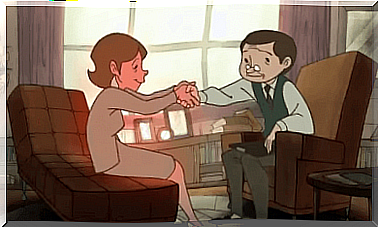Single Parents: Advantages And Disadvantages

There are many different types of families today. Z unehmend more include single parents and their children. They are families that are characterized by the absence of a second parent. Like all family types, this one also has some peculiarities that distinguish it from other variants such as the nuclear family. One of these peculiarities is that children may have to live in a conflict situation that their parents created.
However, there are other characteristics that reveal the adjustment process these families have had to go through – or still need to go through – in order to be recognized as part of society. And of course society had to and must develop further in order to be able to fully accept these families and to give them the same opportunities for healthy development as the aforementioned nuclear family.
Different types of single parents
Single parent families are essentially families where only one adult is fully responsible for one or more children. This is a very heterogeneous concept, however, as single-parent families can be formed in many ways:
- A divorced father or mother who lives with the children
- A widower who lives with the children
- A single woman or a man who has decided to adopt.
- A teenage girl who had a baby and decided to stay home to raise her child
- …
“People get divorced for a variety of reasons, but essentially they do it because they couldn’t have a good marriage or were unwilling to settle for a bad one.”
Paul Bohannan
Single parent benefits
The lack of one of the parent figures strengthens the affection for the existing parent in many cases. Similarly, the absence of a mother or father tends to make the single parent more independent when it comes to making decisions about the children. It also means they don’t have to grapple with arguments about how they want to raise their children. Corresponding conflicts are avoided. This flexible and relaxed environment can create a more comfortable family atmosphere.
In single-parent families, children are generally more independent. Many of these children, for example, have to take on the role of absent parent with regard to younger siblings and, because of their age, take on greater responsibility than they would have to do in other family forms. These requirements encourage adaptation and help children mature earlier. Admittedly, this can become a burden if certain limits are exceeded.
Disadvantages of single parents
One of the main difficulties of this type of family is that the children are exposed to the conflicts of their parents that persist beyond the separation. It is obvious that these problems have a direct impact on the children. In many cases, this clash of parenting disputes leaves a deep wound that reverberates through childhood and can continue to cause harm long afterward.
While the absence of disputes related to raising children can be a benefit , the lack of input from a second adult can also be perceived as a tremendous burden by the single parent. After all, it is completely alone – and often very difficult – to bear responsibility for the development of the offspring. The single parent lacks the opportunity to exchange views with another person, debate solutions to potential problems, or simply transfer responsibility for certain decisions to another person.
Raising a child alone increases the physical strain and places high demands on logistics and coordination. As a result, affected parents tend to spend less time looking after their own needs or do not see them as a priority. This makes them prone to mental health problems.
In addition, children can experience rejection from outsiders as a result of a nontraditional family.

Less privacy and more freedom for the child
In single-parent families, children may not respect their parents’ privacy. This is simply because they don’t know what couple intimacy means. In some cases, they interrupt others in their conversations or take part in decisions that do not actually affect them because of their age. Conversely, this circumstance can also lead to the single parent giving the child more freedom to do what they want. And the children, in turn, are obviously taking advantage of that.
As mentioned earlier, the child sometimes has to play the role of the absent parent as well. Then such absurd situations can arise, such as a ban on the part of the children from the mother going out with her friends, or they even ask to share the bed with her. And single parents lack the partner who has invested enough in raising the child to let them know that they are doing something wrong.
Even so, single parents are still bound by the same ingredients as any other family if they want to see their children happy: love, protection, security, and constant care.









